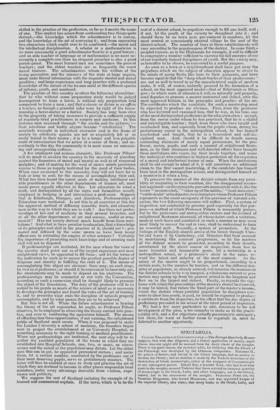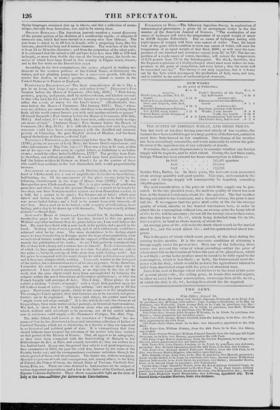SPECTABILIA.
CLASSIC TREASURES AT CONSTANTINOPLE.—The Foreign Quarterly Rmiete. suggests, that with due diligence, and a liberal application of money, much: classic treasure might still be rescued from the dusty chests of the seraglio, There is too good reason, the reviewer adds, for believing that the library of the Palceologi was destroyed by the Ottoman conquerors. Mahomet IL, the patron of letters, and versed in the Greek language, had no motive to destroy the library; and no mention is made by the Turkish historians of the destruction of Greek manuscripts, either at the conquest of Constantinople or any subsequent period. Ismael Bey, a learned Turk, who had lived nine years in the seraglio, assured Toderini that there existed an immense quantity of manuscripts in the Greek, Latin, and other languages, not in the library, indeed, but in the store-rooms of the seraglio. Francesco FrancLini, the Venetian Dragoman, who turned Musulmau, and was appointed keeper of the imperial library, also states, that many books iu the Greek, Latin, and
Syriac languages remained shut up in chests, and that a collection of manu- scripts, brought front Jerusalem, was said to be among them.
ORGANIC REMAINS.—TIIC American journals mention a recent discovery of the greater portion of the skeleton of a nondescript reptile, or alligator of immense size, which had been buried in a swamp near New Orleans. The jaw-bone is stated to be 20 feet in length, with a projecting horn, like the unicorn, about 9 feet long and 8 inches diameter. The vertebra of the back is from 15 to 16 inches diameter ; and from the proportion dile other parts, it is estimated that the animal could not have been less than 160 or 170 feet in length, or more than double the size of the Saurian genus, the fossile re- mains of which have been found in this country in Tilgate forest, Sussex, and in the lies strata on the Dorset-hire coast.
According to the best computations, the system adopted in making set- tlements in the western portions of the United States, of destroying the timber, and not planting young trees for a succession growth, bids fair to render fine timber, in another quarter-century, almost as scarce in the United States as in France or England.
PURITANICAL ELOQUENCE.—" The fresh remembrance of sin is like a pea in an issue, that keeps it open, and makes it run." (Sperstow's Fast Sermon before the House of Commons, 21st July, 1643.) " That Satan, prelates, papists, malignants, shall be under-workmen, and kitchen servants to him who limit his fire in Sion, and his furnace at Jerusalem, to purify and refine the vessels of mercy for the Lord's house." (Rutherford's Ser- mon before the House of Commons, 31st January, 1613.) That, " when- ever the children are come to the With, and there is no strength to bring them forth, all the world cannot furnish you with such another midwife as prayer." (Edward Reynolds's Fast Sermon before the House of Commons, 27th July, 1643.) And asked, ii" we shall, like tame fools, suffer every body to wipe our noses of God." (Ambrose Perne's Fast Sermon before the House of Commons, 31st May, 1613.) It is difficult to conceive, that such degrading nonsense could have been contemporary with the dignified and sonorous periods of Clarendon, the pure English diction of Hooker, and the keen logical deductions of Barrow.—Seciat Life. NAPOLEON L'EMPEREUR.—In a manuscript letter from Mr. Bryan Fairfax, (170 I) giving an account of Lady Mary, the famous Dutch rope-dancer. and other amusements at May Fair, says,—" Here was a boy to be seen, 'within one of his eyes was Deus pleas, in capital letters, as Guliehnus is on half-a- crown ; round the other, he had in Hebrew, 1777." The prodigy from Paris is, therefore, not without precedent. It would have been judicious to have had the letters written in llebrew or Greek ; for as the number of those who could bear evidence to the fact diminished, faith would proportionably increase.
Amuseenetee OF OP R Axcestroes.—At Hockley-Imle, in the neighbour- hood of Clerken well, was a sort of amphitheatre dedicated to bear-baiting,
Nc. Of the amusements of this place we may judge by the following advertisement in the reign of Queen Anne (1709): t• At the Bear-garden near Clarkenwell-green. This is to give notice to all gentlemen gamesters and others that on this present Monday is a match to be fought by two dogs, one from Newetate-market against one from lioneylane market, at a bull, for a guinea to be spent ; five let-goes out of hand : which goes fairest and fastest in, wins all. Likewise a green bull to be baited, which was never baited before ; and a bull to be turned loose with fireworks all over him. Also a mad ass to be baited ; with a variety of bull-baiting, bear- baiting, and a dog to be drawn up with fireworks. To begin exactly at three o'clock."—Social Life.
Au en BeN'S BIRDS OF ANIERICA.-1 have heard that N. Audubon resided twenty-live years in the woods of America, devoted to this one pursuit. Without any other testimony than the plates before me, I can well believe the fact, lie imist have lived with a note book in his pocket, and a pencil in his hand. Nothing short of such a period, and of such enthusiasm, could have achieved what he has done. The same devotedness to his darling object seems to have brought Iffin to Europe, under the hope of accomplishing what tin indiv in I nal fortune could do, without the support of liberality and wealth ; namely the publication of his works. As yet 1 feel perfectly convinced that this is ■Inne with a heavy and a serious loss to himself. Each of the numbers, of which six have appeared, contain no less than live plates, and are sold at two guineas, being an average of little more than eight shilling,. each ! Let this price Inc compared with the nautd charge for either publications, or prints, and it becomes comparatively nothing. 1 can only, wonder at the disregard of the author, for a remuneration even of his own expenses. So far, therefore, I consider his work as comparatively, one of the cheapest that can be purchased. I have heard it mentioned, as an objection to the size of the work, that the same object could have been accompliahed by bringing the subjects within the usual dimensions of illustrative publications ; or what the French happily call ouvralles de /,,.re. This I deny. These plates flO not exhibit a uniform " rivulet of margin." with a sinew bird perched upon the tall leafless trunk of a tree, "signifying nothing," and merely put to fill the paper. Here every object speaks, either to the senses or to the imagination. The examples I have quoted, show that histories are to be narrated, and pecu- liarities are to be explained. To trace such things, the painter must have " ample room and verge enough." It is this which elevates the character of Iris paintings, front mere matter-of-fact portraits, to historical representations. We feel, in short, that it is AI. Audubon alone who can produce a work, whieh, without such advantages as he possesses, not all the united talents now in existence could supply.—Me. Suniinson's Critique, Nat. Hist. .:1Iag. The Abbd Allard, well known as the translator of " Tertullian," has an- nouncetl'that he has discovered a large and interesting collection of Letters of Cardinal Mazarin, which are as interesting in a literary as they arc important in an historical and political point of view. • It is extraordinary that they should hitherto have escaped the attention Of the writers who have written on that period of the History of France. They all appear to be autographs, as they have been compared with the hand-writing of Mazarin in the Bibliotheque du Roi, at Paris, and exactly resemble it ; they are written in a Sire Italian hand. At any rate, the period they refer to is of great importance; they commence in 16-18, the year the civil sear, known by the name of the Fronde, broke out; and the correspondence continues unbroken through the whole period of these civil disturbances. The letters are, without exception, directed to persons of rank and consequence, and, anteing others, to the King of Poland, the Prince of Savoy, the Grand Duke of Tuscany, Cardinals Bar- berini, Este, 8,:e. There are some directed to Ambassadors on the subject of various important negociations, and a few to the father of the Cardinal, and to Signora Colonna-Barherini. These throw considerable light oat the state of italy at the time...diAtterfer laterariscao Unterhaatatch
Fonseteins OF Ham.—The following ingenious theory, in explanation of meteorological phenomena, is given by an anonymous writer in the last number of the American Journal of Science. "The combustion of one ounce of hydrogen will raise the temperature of an equal weight of water to 42120 degrees Fahrenheit. But an ounce of hydrogen uniting with eight ounces of oxygen will form nine ounces of water. Thus, the latent heat of the gases svhich combine to form one ounce of water, will raise the temperature of ant equal weight of that fluid, 4680; or will raise the tem- perature of. one hundred and seventeen ounces from 32° to 72°. The decom- position of a single ounce of water, therefore, will reduce the temperature of 9.75 pounds from 72° to the freezing-point. We think, therefore, that the frequent explosions of a highly-charged cloud must soon reduce its tem- perature to the point of congelation, and even below ; thus the water will be converted into ice." This theory is not only ingenious, but it is borne out by the facts which accompany the production of hail, snow, and rain, and is entitled to the notice of meteorological observers.



















 Previous page
Previous page